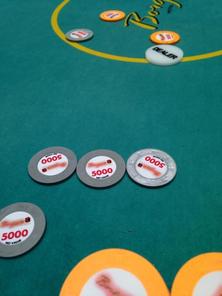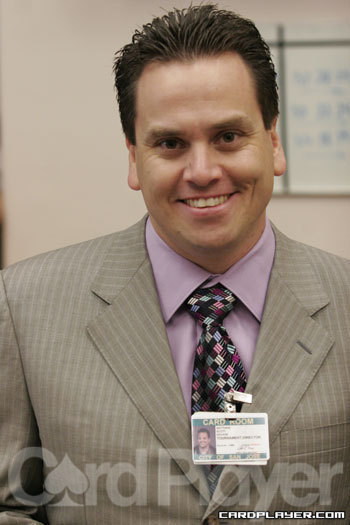






Tournament Directors Discuss Poker Chip SecurityMatt Savage, Jack Effel and Steve Zolotow Weigh In On Poker Chip Security Issues |
|
|
 In January, the Borgata in Atlantic City was forced to cancel a $2 million guaranteed poker tournament after it was discovered that a player allegedly introduced counterfeit chips into the event in order to gain an advantage over the rest of the field. Some of the tournament’s entrants have since filed a lawsuit against the casino and the issue remains unresolved.
In January, the Borgata in Atlantic City was forced to cancel a $2 million guaranteed poker tournament after it was discovered that a player allegedly introduced counterfeit chips into the event in order to gain an advantage over the rest of the field. Some of the tournament’s entrants have since filed a lawsuit against the casino and the issue remains unresolved.
A month later at the World Series of Poker Circuit stop at Palm Beach Kennel Club in Florida, another player was stripped of winnings and banned from all Caesars Entertainment properties and WSOP events after it was determined that he pocketed a chip from his stack during heads-up play.
So does this mean we are the middle of a poker chip scandal epidemic? No, according to WSOP Tournament Director Jack Effel.
“The fact that in all cases the perpetrators were caught is evidence that [the] procedures work,” Effel said. “We don’t discuss specifics regarding our chip security procedures, but know that all chips in and out of events are controlled, documented, and audited on an ongoing basis. When the same chip set is in play for restarts and final tables, they are monitored closely but usually there are different denominations on the table at that point. Keep in mind that our dealers and floor staff are trained to treat tournament chips as though they were as sensitive as cash.”
 Matt Savage, the Executive Tour Director for the World Poker Tour, agrees that these are isolated incidents. Savage admits that he’s been lucky to not have had any issues in his events at the Commerce Casino, but recognizes that some poker tournaments could do more to protect themselves from cheats.
Matt Savage, the Executive Tour Director for the World Poker Tour, agrees that these are isolated incidents. Savage admits that he’s been lucky to not have had any issues in his events at the Commerce Casino, but recognizes that some poker tournaments could do more to protect themselves from cheats.
“In my opinion, one of the biggest problems at some of these places is that they leave too many chips out in play,” Savage said. “They are ripe for the picking, because they are not doing enough color changes during play. I tend to do more color changes than most tournament directors, but that’s the best way to protect your inventory. There are some tournaments that allow players to hold on to eight or nine racks of chips at a time. Compare that to a tournament that has players sitting with less than a rack of chips in front of them. Which tournament is going to be easier to compromise? It may make for a cool photo, but it’s not very practical.”
Savage made it clear that even the best run tournaments can be compromised because of the chips themselves, which don’t always feature complicated patterns or designs. A good chip set can cost about $0.75 per chip.
“A tournament chip needs an edge marking,” Savage said. “Some places are running small daily tournaments and can’t afford custom sets, but if you are handling a tournament with millions of dollars at stake, the chips have to be difficult, if not impossible to duplicate.”
Savage has even taken his security measures one step further, policing his chips after a tournament has ended.
“I might be giving away a trade secret here, but I think its super important for a floorman to go and get the chips the minute the tournament is over. Your job is to get them and make sure everything adds up. Sometimes there will be a winner photo taken, but I don’t allow the players to sit there with all of the chips. If you look at my winner photos, the players are sitting behind neat stacks of 20, which makes it a lot more obvious if a chip is taken.”

“One thing we do for bracelet events is use a 3x multiplier, so chips are not worth more or less in any particular event,” Effel said. “If there is a one off event that falls out of the 3x multiplier, then we will use a different chip set for that specific event.”
What Effel is describing is a mistake that so many other properties make when establishing a starting stack amount in their tournaments. Card Player columnist Steve Zolotow, in an upcoming edition of the magazine, reiterated the importance of a scaled stack to buy-in ratio.
“While all tournament chips say, ‘no cash value,’ they all have one,” explained Zolotow. “If you pay a $500 entry fee and get 1,000 in chips, the cash value is half of the face value. I was at a tournament where a low-entry super satellite gave 2,000 in chips for $100 cash. On that same day, in the main tournament, players got 2,000 in chips for $500 cash. The same chips were used. Any unscrupulous player who managed to take chips from the satellite into the tournament made a 500 percent profit.”
Zolotow believes that because poker is game played against other players, not the house, it’s up to the players to make sure they are getting a fair shake.

Poker has always been a self-policing game and sharp, attentive players will always be the best deterrent for cheaters.
“We all have a responsibility to do what we can,” said Effel. “We invest [in] and use video surveillance throughout, and ultimately the eye in the sky will catch it all and has been very effective in corroborating and verifying any issues that arise. [However], a chip police force made up of players and dealers are the first line of defense. Players should be cognizant of other players chip stacks at their table. The major objective in a poker tournament is to win the other players chips. Therefore, players should be aware of how many chips their opponents have at all times. If a player suspects that chips may be missing or added to another player’s stack, they should discretely get up from the table and notify the section supervisor. We will then investigate and take appropriate action.”
“If you feel there’s something wrong at the table, then come and tell us,” Savage added. “Poker is, for good or for bad, self policing. The floor staff is there to protect the players, but the players need to remain vigilant in protecting themselves as well.”
